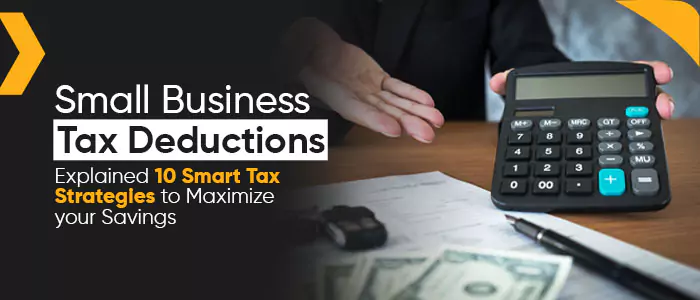Running a small business is rewarding, but managing taxes can be a headache sometimes. Fortunately, we are here to guide you on how to reduce your taxable income, lower your tax bill, and free up resources with small business tax deduction.
In Canada, the Canada Revenue Agency (CRA) offers several tax deductions specifically tailored for small businesses and we will discuss them with you in detail. So, Stay Tuned!
In this guide, we’ll break down:
- What Small Business Tax Deductions are.
- What expenses qualify for deductions.
- 10 detailed strategies to maximize your deductions.
- Practical tips for keeping accurate records.
Let’s dive in and ensure you’re not leaving money on the table when tax season arrives!
What are Tax Deductions?
Tax deductions, also referred to as tax write-offs, allow you to subtract eligible expenses from your total income. This reduces your taxable income, which in turn lowers your tax liability.
For example:
- If your business earns $100,000 annually and you claim $20,000 in deductions, you will only be taxed on $80,000.
- Claiming deductions can also bump you into a lower tax bracket, saving you even more money.
What Qualifies as a Tax-Deductible Expense?
The CRA allows deductions for reasonable and necessary expenses incurred while earning business income. These generally fall into three categories:
| Category | Examples |
| Operating Expenses | Inventory, tools, software subscriptions |
| Workspace Costs | Office rent, utilities, insurance |
| Travel and Vehicle Costs | Fuel, parking fees, travel tickets |
Key Takeaway: Every dollar spent on your business could potentially reduce your taxable income. Keep receipts and track all expenses!
10 Smart Tax Strategies for Small Businesses in Canada
Tax season can feel like a maze for small business owners, but Small Business Tax Deductions offer significant opportunities to reduce your taxable income and keep more money in your business.
Below, we’ll break down 10 detailed strategies to maximize your deductions, using clear examples and practical explanations.
1. General Business Expenses: Know What You Can Deduct
Running a business comes with regular costs, and many of these are fully deductible. The Canada Revenue Agency (CRA) allows deductions for necessary and reasonable expenses directly tied to your business operations.
a) Licenses, Memberships, and Subscriptions
- Annual Business License Fees: Any licensing fees required to legally operate your business are fully deductible.
- Professional Membership Dues: Fees paid to professional associations (e.g., accounting or legal bodies) qualify for deductions.
- Subscriptions: Trade publications, journals, and online tools related to your industry are also deductible.
Example: If you pay $500 annually for a trade association membership and $300 for a subscription to a professional magazine, both amounts can be claimed as deductions.
b) Insurance Premiums
Insurance is vital for protecting your business, and most insurance premiums qualify as deductible expenses, including:
- General Business Liability Insurance
- Property Insurance for Your Office or Storefront
- Business Interruption Insurance
Key Note: Life insurance premiums are only deductible if the policy is used as collateral for a business loan.
c) Tools and Equipment
From office supplies like pens and paper to specialized tools (e.g., a landscaper’s mower or a carpenter’s drill), these expenses are deductible.
Pro Tip: Keep all receipts and invoices organized to support your claims during tax season.
2. Home Office Deduction: Turn Your Home into a Tax-Saving Asset
Working from home can offer considerable tax advantages. If your home doubles as your workspace, you can deduct a portion of home expenses directly tied to your business operations
What Can You Deduct?
- Rent or Mortgage Interest
- Utilities (Heat, Electricity, Water)
- Property Taxes
- Home Insurance
- Maintenance and Repairs
How to Calculate the Deduction:
If your home office takes up 10% of your home’s total space, you can deduct 10% of these expenses.
Example:
- Total annual rent: $24,000
- Office space percentage: 10%
- Deduction: $2,400

Eligibility Requirements:
- Your home office must be your primary place of business.
- The space must be used exclusively for business purposes.
3. Employee Wages and Benefits: Deduct the Costs of Your Team
If you have employees, you can deduct wages, salaries, and benefits as business expenses.
What’s Deductible?
- Employee Wages and Salaries: Payments made to your team for their services.
- Employer Contributions: CPP/QPP contributions, Employment Insurance (EI) premiums, and other payroll deductions.
- Health Benefits: Insurance premiums for employee health or disability coverage.

Special Cases: Paying Family Members
You can pay your child or spouse a salary for legitimate work they perform in your business. However:
- The salary must be reasonable for the work performed.
- The payment must be documented with pay slips or bank transfers.
Example: If your child helps with bookkeeping and you pay them $8,000 per year, you can claim this amount as a deduction, provided it meets CRA guidelines.
4.Vehicle Expenses: Drive Down Your Tax Bill
Using your vehicle for business purposes can significantly reduce your taxable income.
What Can You Deduct?
- Fuel and Oil Costs
- Vehicle Insurance Premiums
- Maintenance and Repairs
- Parking Fees and Tolls
- Lease Payments or Loan Interest
How to Calculate Your Deduction:
If you use your vehicle for both personal and business purposes, only the business-use portion is deductible.
Example:
- Total annual vehicle expenses: $10,000
- Business usage: 70%
- Deduction: $7,000
Keep a Logbook:
Track your vehicle use by maintaining a logbook with details like:
- Date of each trip
- Distance traveled
- Purpose of the trip
5. Depreciation Expense: Spread Out the Costs of Big Purchases
When you purchase significant assets like machinery, equipment, or furniture, you can’t deduct the full cost immediately. Instead, you’ll claim these expenses over time through depreciation.
Methods of Depreciation:
- Capital Cost Allowance (CCA): Deduct a percentage of an asset’s cost each year.
- Bonus Depreciation: Deduct a larger percentage in the first year if eligible.
Example:
- Equipment cost: $10,000
- CCA Rate: 20% per year
- Deduction for the first year: $2,000
Key Note: Vehicles, machinery, and computers typically have different CCA rates.
6. Meals and Entertainment: Know the Rules
Meals and entertainment expenses incurred during business activities are partially deductible.
What Can You Deduct?
- Client Dinners
- Team Lunches for Special Events
- Networking Event Costs
Deduction Rate: Usually, you can claim 50% of these expenses.
Exceptions (100% Deductible):
- Meals for office parties (up to six events annually)
- Meals provided to remote work camps
7. Bad Debt Expense: Recover Unpaid Invoices
If a customer fails to pay for goods or services, you can claim the bad debt expense as a deduction.
Requirements for Claiming Bad Debt:
- The debt must have been previously reported as income.
- You must show proof of attempts to collect the debt.
Example: If you invoiced a client for $2,000 but they never paid, you can claim this amount as a deduction.
8. Advertising and Marketing Expenses
Promoting your business can help you grow, and the costs are tax-deductible.
What Qualifies?
- Print Ads in Canadian Newspapers
- Online Ads (e.g., Google, Facebook)
- Promotional Materials (e.g., flyers, brochures)
Restrictions:
- Ads on foreign television or radio stations targeting Canadian audiences are not deductible.
9. Education and Training
Investing in education is an investment in your business.
What Can You Deduct?
- Conference registration fees
- Industry-related workshops
- Professional development courses
Example: Attending a $1,000 digital marketing workshop qualifies as a deductible expense.
10. Health Insurance Premiums
For self-employed individuals, health insurance premiums may be tax-deductible.
Private Health Services Plan (PHSP):
- Premiums for medical, dental, or vision care plans are deductible.
- Coverage must extend to yourself, your family, or your employees.
Example: If your annual health insurance premium is $2,500, you can deduct this amount.

Record Keeping and Why It Is Important for Small Business Tax Deductions
When it comes to Small Business Tax Deductions, proper record-keeping is really important. The Canada Revenue Agency (CRA) requires small business owners to keep detailed records of every financial transaction to support their tax claims. Without accurate documentation, you risk missing out on valuable tax deductible items for small businesses and facing potential issues during audits.
Why Record Keeping Matters for Small Business Tax Deductions
Every tax deductible item you claim needs proof. Whether it’s a receipt for office supplies, a logbook for vehicle mileage, or an invoice for professional services, these documents form the foundation of your small business tax claims. Proper documentation not only helps you claim all eligible deductions but also protects you from penalties in case of an audit.
For example, if you’re deducting depreciation expenses on a new office computer, you’ll need the original purchase receipt, proof of payment, and details about how the computer is used for business purposes.
What Records Should Small Business Owners Keep?
To fully benefit from tax benefits for small businesses, you need to maintain records of:
- Income Statements: All sources of income, including sales and service payments.
- Expense Receipts: Proof of every tax deductible item for small businesses, such as office supplies, travel costs, and meals.
- Bank Statements: Records of transactions from your business accounts.
- Mileage Logs: For vehicles used for business purposes.
- Invoices and Contracts: Agreements with suppliers, clients, and service providers.
- Payroll Records: Details of wages, benefits, and contributions for employees.
Pro Tip: Use cloud-based accounting software to organize and store records securely. It simplifies year-end tax filing and ensures your small business tax deductions are fully optimized.
How Long Should You Keep Records?
The CRA requires small businesses to retain financial records for at least six years from the end of the tax year. If your business is involved in any legal or tax-related disputes, you may need to keep them longer.
The Role of Accurate Records in Maximizing Tax Deductions
Accurate and up-to-date records ensure you don’t miss out on any eligible small business tax deductions. Whether you’re claiming moving expenses deductions, tax breaks for small businesses, or depreciation expenses, well-kept records make the filing process smoother and reduce the risk of errors.
For instance, if you run a sole proprietorship and taxes are due, maintaining records of all tax deductible items for self-employed individuals can help ensure you claim every possible deduction.
Save Time with Professional Help
Managing financial records can be time-consuming, but it’s a crucial task for optimizing tax deductions. Professional accounting services, like Bestax Accounting, can help you:
- Organize and store financial records securely.
- Identify overlooked tax deductible expenses.
- Ensure compliance with CRA guidelines.
Don’t let poor record keeping cost your business money. Contact us now for FREE CONSULTATION!
Frequently Asked Questions (FAQs) About Small Business Tax Deductions
What are tax deductible expenses?
Tax deductible expenses are costs that small business owners can subtract from their total income to lower their taxable income. These expenses must be directly related to running or maintaining the business. Examples of tax deductible items for small businesses include rent, office supplies, employee wages, insurance premiums, travel costs, and professional fees. Keeping accurate records of these expenses ensures you can claim them properly and maximize your small business tax deductions.
Can I claim rent on my taxes?
Yes, rent is one of the most common tax deductible items for small businesses. If you rent office space or use part of your home exclusively for business purposes, you can claim a portion of your rent as a deduction. For home office deductions, the percentage of space used for business determines the amount you can claim. Proper documentation, such as lease agreements and receipts, is essential when claiming rent as part of your small business tax deductions.
What does tax deductible mean?
The term tax deductible refers to expenses or costs that can be subtracted from your gross income, reducing the amount of income subject to taxation. In simpler terms, tax deductible expenses lower your taxable income, which can result in a smaller tax bill.
What to write off on taxes?
Small business owners can write off many expenses directly related to running their business. Some common tax deductible items for small businesses include office supplies, advertising costs, rent, utilities, professional fees, insurance premiums, vehicle expenses, and wages paid to employees. You can also claim depreciation expenses for long-term assets like machinery or equipment. To maximize your small business tax deductions, ensure every eligible expense is properly documented and claimed.
Is home loan interest tax deductible?
In Canada, mortgage interest on a personal home is not generally tax deductible. However, if you use part of your home as a workspace for your business, you can claim a portion of your mortgage interest as part of your home office deduction. The percentage is based on the square footage of your home used exclusively for business purposes. This deduction is a valuable part of your small business tax deductions strategy.
What are tax deductible items?
Tax deductible items for small businesses include any expenses necessary to operate or grow the business. Common examples are office supplies, rent, mortgage interest (if applicable to a home office), insurance premiums, advertising costs, employee wages, professional fees, travel costs, and vehicle expenses. Proper documentation is essential to claim these small business tax deductions and ensure compliance with CRA guidelines.
What is Line 10100 on a tax return?
Line 10100 on your Canadian tax return refers to employment income. This line includes income earned from employment, such as salaries, wages, commissions, bonuses, tips, and gratuities.
It is typically shown in box 14 of your T4 slip. While Line 10100 primarily applies to employed individuals, self-employed individuals and business owners should also be aware of this line when reporting mixed income sources. Properly understanding Line 10100 ensures accurate tax reporting and prevents errors in your small business tax claims.
Disclaimer: The information provided in this blog is for general informational purposes only. For professional assistance and advice, please contact experts.




